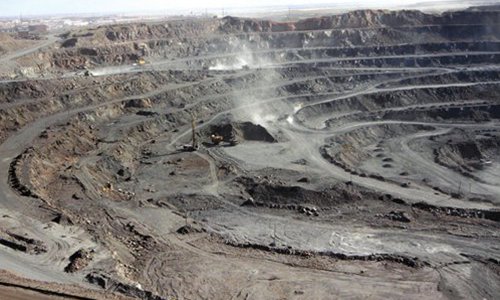HOME >> BUSINESS
Restrict exports of rare-earth magnet to US: insiders
By Li Xuanmin Source:Global Times Published: 2019/6/11 21:38:42
Move could be another method to hit back amid trade war

Mining of rare earths is conducted in Baiyunebo, North China's Inner Mongolia Autonomous Region on July 16, 2011. File photo: VCG
China's rare-earth industry insiders have called on regulators to consider limiting shipments of rare-earth magnets - a small but high value-added downstream product that is an indispensable part of modern electronic products - to hit back at the US, after reports suggested that Washington seeks to boost local upstream rare-earth mining and production.
In this way, China, which supplies up to 90 percent for the global market of rare-earth magnets and dominates some complicated technologies for making magnets, could inflict bigger harm on various US industries, industry insiders suggested, after Chinese officials indicated that the country may weaponize rare earths to retaliate against US suppression of Chinese technology companies.
"As the trade war escalates, the US could opt not to buy rare earths, and instead directly purchase rare-earth magnet parts. Blocking the exports of magnets to the US are like cutting off such an escape: You can stop buying rare earths, but you have to buy magnet parts," a manager of a large state-owned rare-earth magnet maker based in Ganzhou, East China's Jiangxi Province, who spoke on condition of anonymity, told the Global Times on Tuesday.
Rare-earth magnets have become an irreplaceable part that improves the energy efficiency of many products, including vehicles, air conditioners, refrigerators, TVs, smartphones, wind turbines, fighter planes, industrial robots, automation equipment and weapons,
In Ganzhou, a major base for China's rare earths, the number of rare-earth magnet manufacturers is growing 20 percent year-on-year, local officials told the Global Times. China now accounts for 85 to 90 percent, or 160,000 tons to 180,000 tons, of global rare-earth magnet production, industry insiders said, with the rest mostly supplied by Japanese manufacturers.
Industry insiders suggested that compared with rare-earth metals and minerals, restricting the exports of rare-earth magnets could deal "a strategically bigger blow" to those US industries.
In 2018, the US imported $395 million worth of rare-earth magnets, of which $257 million came from China, according to a report by Citigroup issued recently.
For example, Apple's iPhone cameras, vibrating motors and sensors have all used rare-earth magnets to improve their functions, Yu Xi, general manager of Ganzhou Fortune Electronic Co, which makes rare-earth permanent magnets and other items, told the Global Times. "The impact of cutting magnet exports to US companies' supply chains is long-term and destructive," he noted.
Facing a potential cut in supply, the US is reportedly pushing forward efforts to build rare-earth processing plants, including one at the Mountain Pass mine in California, which is expected to open next year.
While resuming rare-earth mining and extraction in the US could take about three years, it may take up to a decade for the US to develop other upstream industries in refining, extraction and electrolyzation and then to the valuable downstream industrial chain, a process that is too long for American companies to afford, the anonymous manager said.
Besides, unlike US companies that would be newcomers to the rare-earth industry, Chinese companies have become world leaders in upstream and some downstream industries, including magnet-making, a representative from a Ganzhou-based permanent magnet company told the Global Times on Monday.
"We have a large degree of initiative in permanent magnet production, with comprehensive strength only trailing after Japan," the person said. In some deep processing and surface treatment technologies, Chinese magnet-makers have outperformed Japanese rivals and applied for patents, the anonymous manager said.
China's abundant rare-earth reserves could also be a form of leverage amid the trade war. China Minmetals Rare Earth Co announced on Tuesday that it has discovered 104,300 tons of rare earth oxides at a mine in Central China's Hunan Province. It is the world's largest single mining area in terms of rare-earth oxide reserves.
Industry insiders said they are not worried about the impact of sliding exports to the US on their businesses, as demand in the domestic market is on the rise. "We're also exploring new markets in India, Japan, South Korea and Germany," the representative said.
Yang Kunyi also contributed to this story
Newspaper headline: Call for rare-earth magnet export ban
Posted in: INDUSTRIES